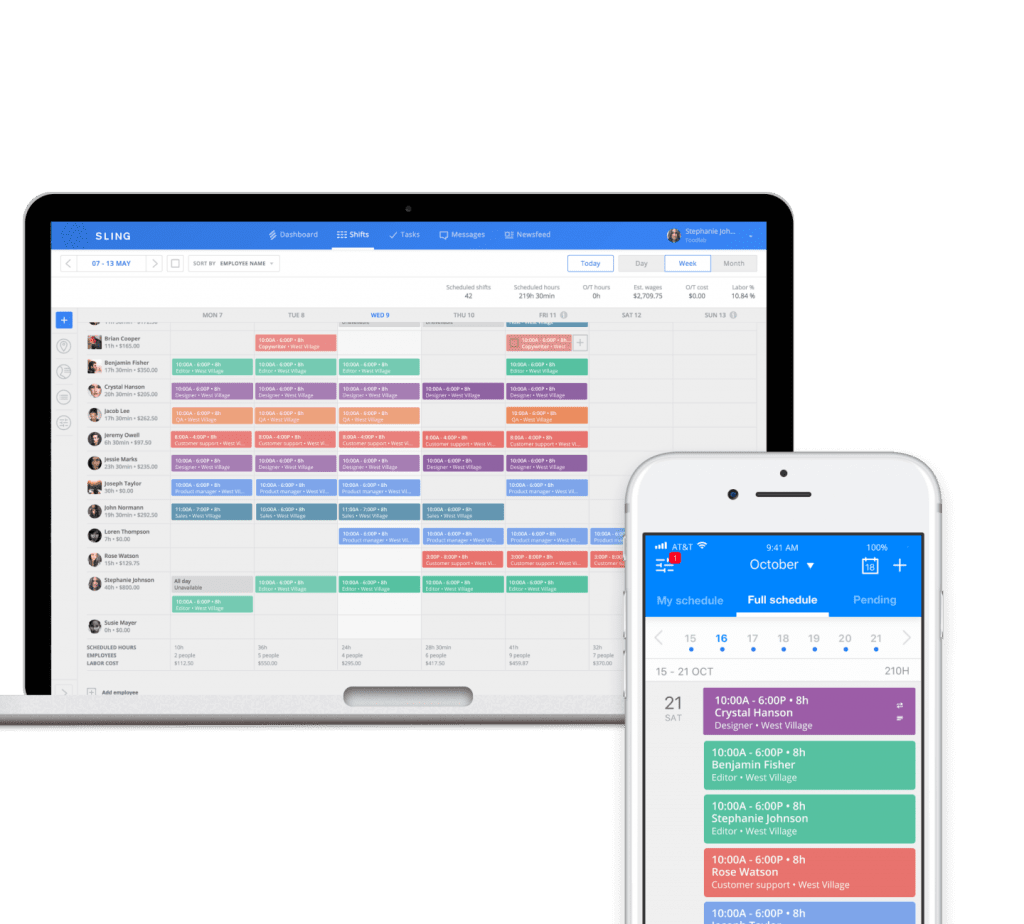Human Resource Planning: Definition, Objectives, And Steps
Human resource planning is an essential part of every successful business. Unfor...

Regardless of the size of your team, human resource management is crucial for the success of your business.
In this article, the experts at Sling focus on human resource management so you fully understand what it is, why it’s important, and how it can affect your business for the better.

Human resource management (or HRM for short) is the process and practice of workforce management and optimization.
Primary responsibilities of the human resources (HR) department include:
The function of human resource management has changed drastically over the years. Early business practices positioned human resources (HR) as a purely administrative role tasked with processing payroll, arranging company outings, and sending birthday gifts.
Now, though, it has evolved into a more critical role tasked with hiring and training high-potential and high-performing employees in alignment with the short- and long-term organizational strategies of the business.
This transformation from administrative to strategic is only a small part of what makes modern HRM vital to the success of your business.

Planning is a big part of what HR does for your organization.
First, the department analyzes the performance of each employee, team, and department as well as how everything works together as a cohesive unit.
Second, they identify ways that all the components — from small to large — can change in order to improve the way they work together.
Third, the HR department begins searching for employees with the right skills to make all of that possible.
Granted, that is a simplified explanation of the planning process — yours may be more involved — but it nicely illustrates the importance of the human resource management department in improving the way your business operates.
Without the right team members on board, your business will not be able to execute any of the corporate strategies that are critical for continued success.
With plans to guide them, HRM then becomes an integral part of staffing your business. As a whole, staffing typically involves the recruitment, hiring, and onboarding of new employees.
Your HR department will develop its own ways to handle these responsibilities, but the core responsibility is to:
An effective staffing process makes all aspects of your business flow more smoothly. Human resource management plays a critical part in making that possible.

Every business has rules and procedures that are unique to the way they work. Yours is no different.
Even if nothing is formally written down in an employee handbook, your team will have, for example, a standard operating procedure, a company culture, and a set of ethics that governs how employees interact and get along.
It’s the responsibility of human resource management — in cooperation with upper management — to codify those policies and enforce them should things go wrong.
The cornerstone of every successful business is the employee/employer relationship.
Without a strong connection between ownership, management, and all levels underneath, it is very difficult to maintain productivity, loyalty, motivation, and focus.
It’s human resource management’s responsibility to manage variables that contribute to the employee/employer relationship, such as:
With a strong employee/employer relationship in place and an effective human resource management program to govern it, your business will thrive.
Compensation and benefits are a significant part of the employee/employer relationship.
And, again, your HR department has a hand in creating and managing this aspect of your business. They work in conjunction with ownership to set wage rates and benefits packages for positions in your business.
Human resources also serves as the channel for communication and acts as a buffer between team members and the higher-ups who dictate policy.
So, if an employee has a question about their pay rate, they ask human resource management. In most cases, HR will answer the question so the CEO or the CFO doesn’t have to take time out of their busy schedule.

Another key responsibility of the HR department is maintaining employee satisfaction and expressing employee appreciation.
Employee satisfaction is the extent to which your employees are happy or content with their job, their responsibilities, the work environment, the company culture, and the leadership, while employee appreciation is recognizing and rewarding employee accomplishments.
Every business is different, but most measure how their teams feel about their jobs by administering an employee satisfaction survey or even an employee self-evaluation.
Armed with that information, HRM can then find ways to boost morale and show appreciation for the hard work your teams give to the business.
Very few new employees will be able to walk in on their first day and jump right in. Even if it’s just getting familiar with your business’s software, team members will need training to fill gaps in their knowledge and skills.
Human resource management coordinates and conducts all these training activities.
And on-the-job training isn’t just restricted to new employees. Long-time employees benefit from developing new competencies as well.
This underscores the point that training is not a one-time affair. Regular training in new knowledge areas, as well as retraining in extant knowledge areas, is the best way to ensure that your employees always have the expertise they need to perform at a high level.
Disputes between team members — and even disputes between employees and customers — will occur no matter how hard you try to prevent them.
The HR department in your business will act as an arbiter when difficulties and differences of opinion arise.
If it’s an issue between two employees, your human resource management department will put a plan in place to resolve the issues and, hopefully, deter them from happening again.
If it’s an issue between an employee/your business and a client, the HR staff will be the go-between in order to maintain both employee and customer loyalty.
The human resource management team in your business is primarily responsible for ensuring that employees are working according to all applicable federal, state, and local laws.
Without periodic checks, rules can change and your business can be left behind. That can expose your company to hefty fines, and even potentially-damaging lawsuits.
An effective HRM program is essential for keeping your business compliant, but the best way to keep all your business activities above board is to consult an attorney versed in your industry.

Regardless of the size of your business, the human resource management department has a lot of very important responsibilities that can have a profound effect on the way you do business, including:
As such, it’s essential that you provide them with software that helps them do their job well. And not just any old programs will do. Nor will cobbling together disparate apps in the hopes that everything will flow smoothly.
For a truly integrated and streamlined HR department, you need a suite of tools that is designed with scheduling, communication, and record-keeping in mind.
Sling is that suite of tools. Features of the Sling app include:
The Sling app even incorporates onboard artificial intelligence that warns you when conflicts arise and then suggests solutions.
Try Sling for free to discover the myriad ways it can help streamline your human resource management and take your business to the next level.
For more free resources to help you manage your business better, organize and schedule your team, and track and calculate labor costs, visit GetSling.com today.
See Here For Last Updated Dates: Link
This content is for informational purposes and is not intended as legal, tax, HR, or any other professional advice. Please contact an attorney or other professional for specific advice.
Schedule faster, communicate better, get things done.